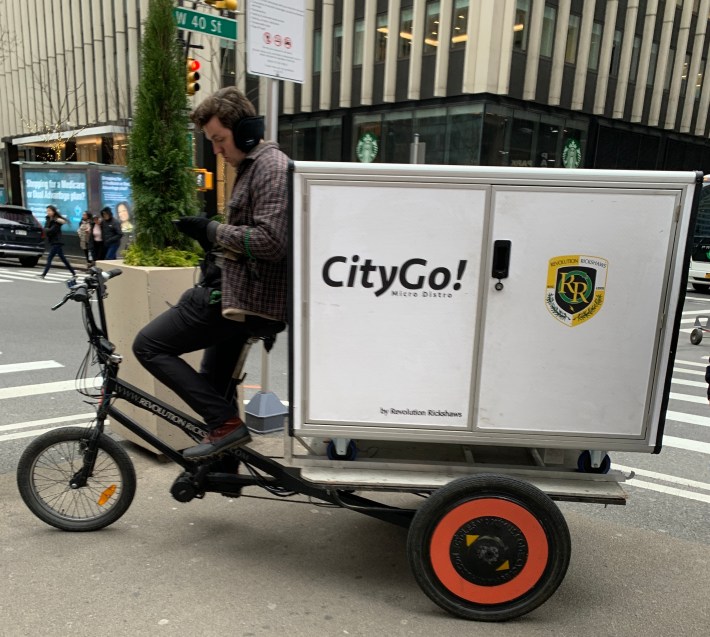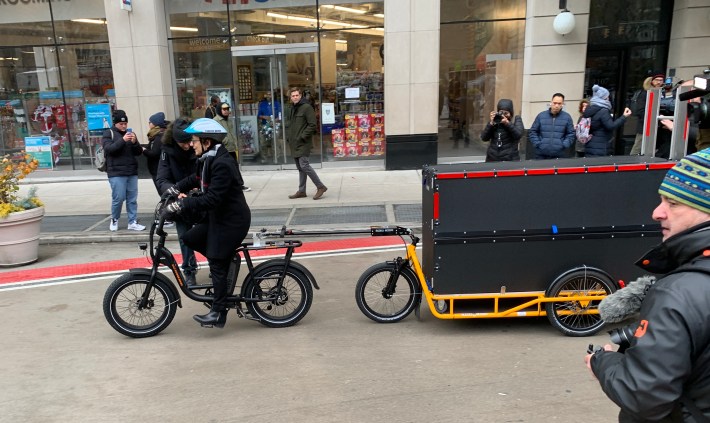Saving this city from a cruel Atlantis-style fate is a game of inches.
The Queens state senator who led the charge to legalize e-bikes is now moving to fix a glaring problem in state law that restricted the high-performance miracle machines to a width of just 36 inches — a rule that overnight destroyed the burgeoning (and climate-friendly) cargo bike industry.
State Senator Jessica Ramos's bill S9004, which was posted today, would change the width rule — which had been inserted into the budget by the governor — to allow for 55-inch-wide bikes.
Those 19 inches are going to make a world of difference.
"It's massive," said Gregg Zuman, whose company, Revolution Rickshaws, was expanding cargo bike deliveries in the city until the burgeoning industry ground to a halt after the budget bill passed. "That state law destroyed the entire cargo e-bike world, so getting a 55-inch rule would be frickin' amazing. It's massive."
Zuman promised that within two years of the passage of the Ramos bill "thousands of e-trikes in New York City, with barges moving pallet loads of goods. There was no way to move US and European pallets on a 36-inch tricycle."
This wasn't the way it was supposed to be.
Late last year, the city Department of Transportation announced a six-month cargo bike pilot program with DHL, UPS and Amazon, and held a photo op showing off the companies' two- and three-wheeled cargo bike systems, the latter being roughly 48 inches wide. The main problem at the time? DHL and UPS had only one or two bikes that they intended to run from their West Side depots. It's unclear if the companies even operated their systems, and by the time the 36-inch rule became law, they were done.

"UPS and DHL have experienced challenges, but are hoping to continue moving forward," a DOT spokesperson said. (DHL confirmed that their cargo bikes are "inactive." UPS did not return a request for comment.)
The DOT spokesperson also blamed Cuomo's budget for undermining the city's initial, albeit small, effort.
"The new state e-bike has delayed the rollout for some pilot program partners," the spokesperson said. "The impact of the 36-inch cap was felt mostly by participants, some of whom had already made substantial investments in cargo bike fleets that were rendered non-compliant. Many standard, off-the-shelf cargo bikes are wider than 36 inches, which has made it more difficult for smaller businesses to purchase compliant fleets. The city continues to engage with our partners in the legislature about addressing this issue."
One company that has not been affected by Gov. Cuomo's yardstick rule is Amazon, which owns Whole Foods. The company was operating scores of cargo bikes in the city when the pilot program was launched last year — fortuitously choosing a bike-and-trailer system that tops out at a few inches wider than 36, but isn't covered in the language of the budget bill (which only covered "a bicycle ... more than 36 inches wide," saying nothing about any trailer).
Amazon's system has allowed for rapid expansion. Earlier this month, the delivery giant — which has pledged to be net carbon neutral by 2040 — made two key hires to its e-bike delivery team, CNBC reported. The hires included Alex Vickers, who previously worked at Jump, the e-bike company; and Justin Ginsburgh, who was involved in the founding of Citi Bike and later for the Lyft-owned company Motivate, which operated Citi Bike.

"The hires indicate Amazon may be looking to e-bikes as another mode of transportation for last-mile delivery, the process of picking up packages from delivery stations and dropping them off at doorsteps, which is a critical and costly piece of the logistics puzzle for Amazon," CNBC reported.
The company declined to comment for this story, which is fine because our sources say that Amazon is indeed expanding its bike-and-trailer systems from merely food deliveries for Whole Foods to include same-day package delivery.
The great challenge of even cargo bike delivery systems is the logistical challenge of creating staging areas where a single big truck can park and unload its modular pods — and the cargo-bike-riding workers can load up and head out into the neighborhoods to make the actual deliveries.
No such staging areas were part of the city's pilot program. Instead, the city said it hoped to gather trip data — such as cargo bike travel times, routes, common pick-up and drop-off locations, and duration of time spent at the curb — so the program could be expanded with rule changes or street design changes at specific locations. (None of that data is being gathered now.)
Staging areas were the secret of Seattle’s successful pilot with UPS last year. A spokesman for the Department of Transportation in the Emerald City told Streetsblog that UPS paid the city for the equivalent of about three parking spaces so it could bring in a large truck that would then disgorge modular units to the cargo bikes, which would make deliveries in the Pioneer Square neighborhood, where weight regulations barred most big trucks.
Zuman's company had been at the forefront of trying to solve many logistical problems, such as where cargo bike delivery workers could get their small payloads, even working with a Brooklyn-based barge company to float large shipments to waterfront areas where they could be picked up by the bikers. That all fell apart when Gov. Cuomo barred cargo bikes wider than 36 inches.
"Overnight, all the investment [in the industry] stopped," he said. "And it was a shame because with some capital, we could deploy thousands of bikes and that would help the city reach its goal for greenhouse gas emissions, remove lots of vans and trucks from the streets, and reactivate the working waterfront."
Brian Hughes of Hughes Marine, the Red Hook-based barge company, was eager to work with Revolution Rickshaws on the titular revolution.
"Bikes are a great option for reducing carbon and keeping trucks off the road," he said. "I know barges and tugboats, so the key for us was getting the cargo from the barge to the land in a way that's environmentally friendly. If they change that 36-inch rule, that's a good thing. We can use the blue highway to clear up the roads and the air."
State Senator Ramos said she doesn't know how the 36-inch rule got inserted into the state budget — such language was not in her e-bike legalization bill that passed the legislature overwhelmingly last year, but was vetoed by the governor before he resurrected the spirit of it in his budget.
"It was a rushed process" to get legalization of e-bikes after the governor issued his surprise veto, she said. The main focus was on delivering justice for e-bike delivery workers who had been the subject of a multi-year crackdown by Mayor de Blasio, even though hundreds of thousands of New Yorkers were employing the hard-working delivery people every time they used a food delivery app or ordered takeout from a local restaurant.
Supporters of the pedicab industry were particularly vehement against the 36-inch rule, Ramos said, because it endangered their livelihood.






